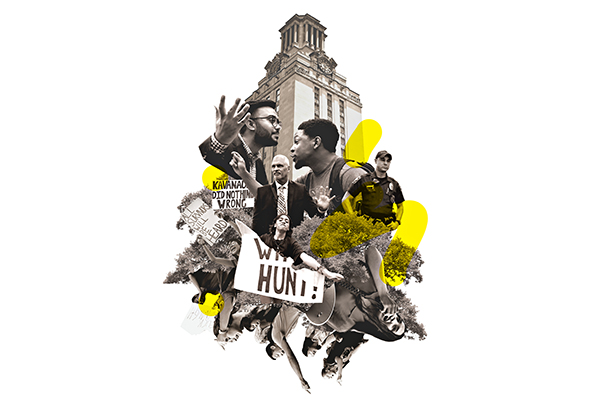The University of Texas, like many universities nationwide, is facing scrutiny for policies free speech advocates say stifle protected speech. Advocates say two policies in particular are vague and don’t comply with decades of Supreme Court precedents.
Free speech advocacy organization Speech First filed a lawsuit against the University in December, claiming the school’s acceptable use and harassment policies are too vague and could prevent free discourse on campus. The organization advocates for free speech on college campuses nationwide. Speech First also filed a lawsuit, which is still pending, against the University of Michigan in May.
The Foundation of Individual Rights in Education, or FIRE, agrees. FIRE gives UT a “red” rating for these policies, which places the school in the bottom 28% of universities in the country for freedom of speech. FIRE, in its 20th year of operation, analyzes the policies of almost 500 schools.
Speech First’s lawsuit
Speech First filed its lawsuit on behalf of unnamed students, faculty, parents and alumni who are unhappy with UT policies.
One of those policies, the school’s Acceptable Use Policy, dictates what can and can’t be said on University computers. It requires users “Be civil. Do not send rude or harassing correspondence.”
“This lawsuit was initiated because our members’ rights have been violated,” Speech First President Nicole Neily said in an email. “(The policies) encompass protected speech and expression, and there are a substantial number of instances in which those policies cannot be applied (consistently) with the First Amendment.”
UT President Greg Fenves and Dean of Students Soncia Reagins-Lilly said in response to Speech First’s claims that they know of no incident where a student was sanctioned or investigated for protected free speech.
But Laura Beltz, senior program officer for policy reform at FIRE, said as written, some of UT’s policies could be applied to prohibit some speech protected by the First Amendment. She said the Acceptable Use Policy is one example.
“‘Rude’ is such a vague term,” Beltz said. “It doesn’t have a legal definition, so you could really include any speech that someone subjectively finds rude. But even if someone finds an email rude, it’s still constitutionally protected.”
Beltz suggested the policy be changed to only restrict speech that is actually illegal, such as true threats or defamation.
The group also takes issue with the policy on Sex Discrimination, Sexual Harassment, Sexual Assault, Sexual Misconduct, Interpersonal Violence and Stalking. UT’s policy defines sexual harassment as “unwelcome conduct of a sexual nature.” Again, Beltz said this contradicts Supreme Court precedent that requires speech to be “severe, pervasive and objectively offensive.”
The policy later defines harassment more specifically to include definitions of physical and verbal acts. But Beltz says because the initial definition of sexual harassment is so broad, it can be misleading. She said including the “severe, pervasive and objectively offensive” clause at the start would make the policy run more in line with the Court’s precedent.
The lawsuit also critiques the University’s Residence Hall Manual for vague wording prohibiting “uncivil behavior” and the Campus Climate Response Team for vague definitions of “bias incidents.”
University spokesperson J.B. Bird said the Speech First lawsuit does not showcase the school’s policies in their whole.
“I think there’s very good evidence from what happens on campus that there is robust freedom of speech, and that we protect it very thoughtfully, proactively and conscientiously,” Bird said. “In fact, what we tend to receive is criticism from people who want to constrain free speech.”
Although Beltz said changes to the policies would be pretty simple to make, and FIRE representatives have presented their suggestions to UT officials in the past, the policies remained unchanged.
Bird said the University can change its policies and does so routinely. However, when asked if making these adjustments would be something the school would consider, Bird said the school first considers input from multiple stakeholders, including students, staff and the state Legislature.
“FIRE is one outside group, but there are other constituencies we are listening to as the University seeks to strike a balance for the best policies that vigorously protect free speech,” Bird said.
Bird said the University is currently waiting for a judge’s response to Speech First’s request for preliminary injunction, which would prevent UT from acting on the policies in question until the lawsuit is settled.
Campus climate
Recent events — including last semester’s demonstration by the Young Conservatives of Texas supporting then-Supreme Court nominee Brett Kavanaugh — have created a dialogue among students about what kind of speech should be allowed on campus. Many criticized UT officials for allowing YCT to demonstrate.
Sara Ross, a Plan II and social work sophomore, said she shouted in a YCT meeting the day after the Kavanaugh demonstration when one of the guest speakers made a rape joke on stage.
Ross said the Office of the Dean of Students asked her to write an essay expressing regret about her actions. She appealed the essay and was later offered a different sanction, but said the University allowing YCT to show signs with statements such as “#MeToo gone too far” created a safety hazard for its students.
“I saw a girl on the ground crying by their table because she was so triggered on her way to class,” Ross said. “UT put its students’ mental health and safety at risk by allowing YCT to threaten its students like that. I don’t think free speech should have to come at the cost of safety.”
YCT Chairman Saurabh Sharma said just because the organization’s rhetoric is different than other organizations on campus doesn’t mean it should be banned.
“(YCT) is not similar to what other organizations do,” Sharma said. “It is in content, but it’s not in kind.Should it be treated differently? I don’t think so.”
The Chicago Statement
In February, UT System chancellor James Milliken said he is considering adopting the Chicago Statement, a set of free speech principles lauded by FIRE and other free speech organizations.
The statement, a short list of free speech standards, would become a “clear and useful reflection” of the System’s commitment to free speech, but would not affect existing school policies, said System spokeswoman Karen Adler.
Student Government passed a resolution in support of adopting the Chicago Statement in February, spearheaded by Lillian Bonin, YCT vice chairman and liberal arts representative.
“The fact is, changing a policy doesn’t signal any sort of commitment by the University for freedom of speech,” government junior Bonin said. “It just signals that there was pressure for that to change. I want to spur the actual culture and thought process within the administration regarding free speech.”
Communication studies professor Rod Hart has been working at UT since 1979, and studies civic participation. He said in the last few decades, he has seen people become more touchy on campus as differences between conservatives and liberal viewpoints grow starker.
“I think the far right is angrier than they’ve ever been because they’re being so overwhelmed by the larger student body’s attitudes,” Hart said. “Knowledge is a process of giving and taking and throwing out the bad stuff and keeping the good stuff. And how do you know what the good stuff is and the bad stuff is, unless you have people arguing from multiple perspectives? It’s the essence of the academic mindset.”





















